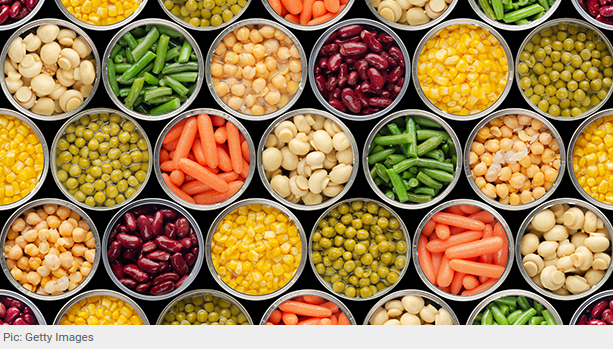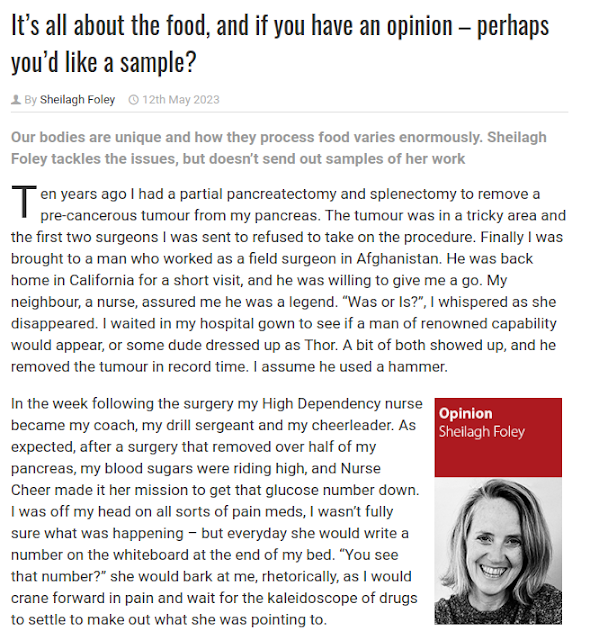The Irish Medical Times - Gut Instinct: disease reversal and prevention through diet
‘What are we going to do with that number?’ I was hoping we were going to eat the number because American hospital jello is not a meal (it’s not even in a food group) and it’s probably contributing to the number on the board she was obsessed with. ‘Were going to bring that number down! That’s right, you got this!’
In reality I had no control over that number as I lay in my hospital bed. Developing diabetes after a distal pancreatectomy is a risk, one that was never discussed with me. But from my bed, thanks to my nurse, I felt I could influence it. I did everything the nurse asked me to do which was mostly these excruciatingly painful slow walks to the nurses station and back. ‘You can do it!’ she’d cheer as I clutched on to my IV pole for dear life. When I wasn’t pole walking, I was staring at the number on the whiteboard, visualising it getting smaller. And sure enough, through a natural rebalance of my insulin, but mostly because of my visualization, my blood sugars stabilised and I left the hospital diabetes free.
Two months later I was pregnant, and during my second trimester I tested positive for gestational diabetes. This time there was no whiteboard and a number I could play mind tricks with. I was given a glucometer, a food diary and assigned a dietician. As luck would have it my diet was already low in refined sugar and fats so I didn’t have to overhaul my lifestyle. But I did have to start eating small meals more regularly and be far more conscious of food combinations and how quickly food released sugar. I piously ate porridge for breakfast every morning and thought this act alone would get me on the cover of Pregnancy Weekly (that’s a zine that doesn’t exist and hopefully never will). I used my glucometer to pinprick blood after every meal and note my blood sugar reading, that’s how I found out my sanctimonious slurping of my stirabout every morning was sending my blood sugar through the roof!
My glucose reading is unique to me, it’s my metabolism interacting with my partial organs, other people may eat the same food and not have as high a reading. I still eat porridge to this day because I like it, it’s got nutrients, but I am now aware that it raises my blood sugar so I don’t eat it every day, if I do eat it I’ll go for a walk or exercise in the hour afterwards to temper down the spike. Even a short walk at a slow pace will knock points off your blood sugar.
Having gestational diabetes was my first introduction to the concept of disease reversal and prevention through diet. This concept has now become an industry, there are podcasts devoted to gut health, TV shows dedicated to examining your poop, a plethora of doctors in functional medicine, apps that work out your macros (the macronutrient % of of carbohydrate, protein and fat in your diet) and of course celebrities and influencers who think they’ve cracked the code on how to eat best.
Recently, Gwyneth Paltrow, the famous actress and well-being guru, revealed her daily routine which involved skipping breakfast, having broth for lunch, and a vegetable paleo dinner. It was celebrated by some as a very health conscious nod to intermittent fasting, and an avoidance of processed food. It was seen by others as disordered eating.
There is a path where a healthy approach can veer towards an eating disorder, especially in an environment where everybody with a phone and a platform is an ‘expert’. So we all have to be mindful of the path we follow. But this internal introspection of our body’s mechanics is throwing up some interesting information.
An area that interests me is our gut health. Evidence shows if we can diversify our microbiome (the microorganisms that live in our gut) through eating a variety of fruit, vegetables, nuts, seeds, pulses, whole grains on a daily basis, we are almost (almost) guaranteed to have a stable healthy weight and see a reduction in inflammation, infection and age related diseases. I like this approach to diet because instead of restrictions it talks of incorporation and variety. According to a doctor I heard on a podcast/TV/poop show, ideally we should be eating at least 30 different plants a week, although if you are eating Busy Lizzies and hydrangeas for breakfast, no wonder you are full.
By creating a healthy microbiome it can help you digest your food, regulate your immune system, influence your brain chemistries and enhance your metabolism overall. The gut microbes can tie back to diabetes as they influence your blood sugar peaks, how you digest fats and how quickly they are cleared. Which can influence inflammation, which can create disease, and we’re into another concentric circle. Blood sugar management, not just for diabetics, but for everyone, is an interesting proposal. One stat I found stated that your average American is eating 100 times more sugar today than they were 100 years ago. As Dr Casey Means neatly put it the ‘normal’ American diet is a glucose rollercoaster.
Chronic inflammation can increase the risk of various diseases; diabetes, heart disease and even cancer. The man behind a lot of the gut research is Prof Tim Spector, a professor of genetic epidemiology in King's College London. He even believes microbes can affect people’s mental health with a diverse set of microbes staving off depression. He doesn’t put any stock in calorie counting and gave the example that two people can eat an identical muffin, one person might have a mild sugar spike and no dip, whereas the other might have a large spike and dip, leaving them with a bigger calorie surplus for that day compared to their pal. He noticed people with better gut health tend to metabolize quicker and have less body fat.
Ultimately, everyone is an individual, I would never tell someone what to eat (except my daughter - eat your greens!). I’ve long believed that we have our own unique reactions to food. I tried restricting carbs for a week and my body didn’t like it at all. My endocrinologist told me I am not a candidate for intermittent fasting. There is no one diet that fits all, I predict the new approach that will pervade the diet/health industry is personalized nutrition, centred around disease reduction/avoidance. People are already sending online health companies their excrement and in turn paying for access to apps that provide them with tailored recipes, daily lessons, and a nutrition coach. So - you send me your s**t and I’ll send you mine?!
As a patient, I want to eat in order to look and feel as healthy and strong as I possibly can be. That’s a much bigger goal than hitting a target weight or dropping a dress size. I don’t think we all need to post off stool samples just yet, but if we started to change the way we think about food, from a foe to a friend, that would be a healthy start.


Comments
Post a Comment